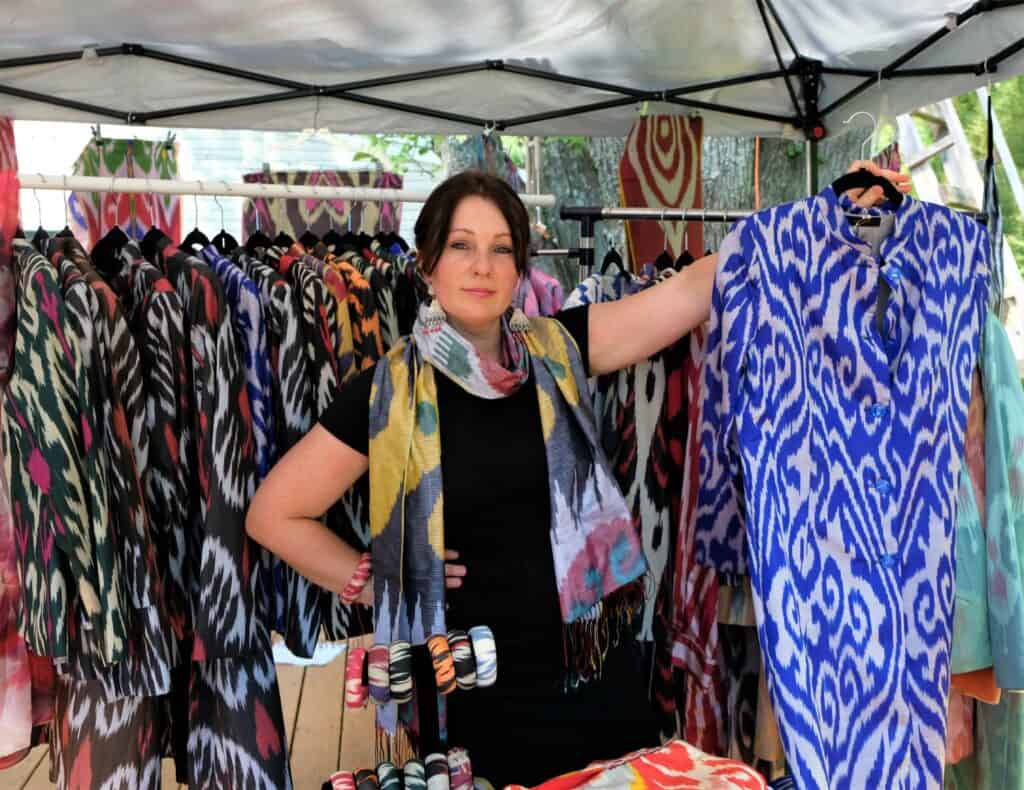This is part of a series of profiles showcasing the talented entrepreneurs of ShopHER, a pop-up incubator for women-owned small businesses in the DC Metro Region. This week we talked to Yulia Semchenko, owner of Yul D’Uz. Yulia designs women’s outerwear and accessories using a traditional, handmade material from Central Asia called ikat.
Hello Yulia! Let’s start with you telling us about your shop, Yul D’Uz. When did you start your business and how did it come about?
I started my business in 2019, but in 2018 I participated in a course run by Empowered Women International, which was designed to support women, mostly immigrants, who wanted to start a business in the US. That gave me the basics like how to pay taxes, how to register my business and do marketing, so that really helped me. And then the pandemic hit, so I don’t count 2020 at all. It completely stopped everything because nobody bought clothes, nobody went outside. In 2021 I joined a program called Shop Local and then later I joined ShopHER.
The business came about because I like fashion! I don’t like to look like everyone else. In 2014 I visited my family in Uzbekistan, where I’m from, and bought about 100 yards of ikat fabric. When I returned to Ukraine where I was living at the time, I wanted to make something special out of it. I didn’t want a traditional dress or jacket, I wanted something modern that I would like. I found a wonderful seamstress in Ukraine – her mother was the main seamstress for the Kyiv Opera House – and I’ve been working with her ever since.
The fabrics are beautiful, can you explain more about the traditional process of making them?
The fabric is called ikat and it exists in many countries. It’s a complicated technique where the pattern is put on the thread before it’s woven. For example, let’s say there are three colors in a design: black, red, and white. First, you would cover all the parts of the threads that have to remain white and black, and dip it in red (typically using natural dyes like certain roots or onion peels). Then you would cover the parts that remain white and red, and dip the threads in black, and so on. Ikat is recognized by UNESCO as a traditional technology that should be safeguarded. During the Soviet time, ikat production was suppressed because these fabrics were seen as being more for rich people, and at the time nobody was supposed to be rich. Nevertheless, some families continued the practice and so after the Soviet Union collapsed, people tried to bring back to life old patterns of design, and the fabrics became fashionable in the West.
Why did you choose ikat fabric as a way to share Uzbek culture in the US?
I grew up in Uzbekistan surrounded by women wearing traditional dresses made from ikat. Uzbekistan is a very bright and colorful country. Spring is beautiful, we have a lot of blooming flowers and fruit trees and then later in the summer we have wonderful markets bursting with color. I think the fabric reflects a life full of joy.
Recently, a Ukrainian friend of yours also joined ShopHER. Tell us about Tanya and the products she sells.
I met Tanya at a market, and she makes beautiful, crocheted bears and rabbits. I bought them for my kids, they love them! Tanya’s daughter is now a refugee in Poland and so she must support her any way she can. All the proceeds from her sales will go towards that. I have relatives and friends in Ukraine and so I also donate a portion of my sales to a charity there as well.
Tanya’s products are a great addition to ShopHER. Finally, what do you wish you had known more about before starting your business?
I’m an English and Russian philologist and teacher by training, but I would have studied sewing more. I can sew, but not as professionally as my seamstress does. I also wish I had realized how tough starting your own business is! If you start from scratch and do everything by yourself, you have to learn a lot. I have great respect for people who have their own business because now I realize how much work it is. My advice is to get some basic business knowledge before you start.
Deb Almond, owner of Candid Almond, one of the ShopHER vendors.
Photo courtesy of Yulia Semchenko.



